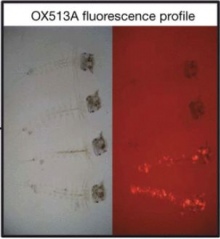80% suppression of a field mosquito population using engineered male mosquitoes

Four larvae are shown, of which the upper two are wildtype and the lower two are engineered. Reproduced from Harris et al. Nat Biotech 2012
80% suppression of a dengue mosquito population in Grand Cayman was achieved following the sustained release of engineered sterile male mosquitoes
Over a 23-week period 3.3 million engineered 'sterile' male mosquitoes were released in a site in Grand Cayman, as described in September's Nature Biotechnology. These mosquitoes were developed by Oxitec and were released in collaboration with the Mosquito Research and Control Unit which provides mosquito control on Grand Cayman and its sister islands. Wild females mated with these 'sterile' males and as a result, by the end of the trial, there was an 80% reduction in the number of mosquitoes found in the release area, compared to nearby areas in which no engineered mosquitoes were released.

Red fluorescence of the engineered mosquito larvae. Four larvae are shown, of which the upper two are wildtype and the lower two are engineered. Reproduced from Harris et al. Nature Biotechnology 2012.
Nature Biotechnology
Volume:30,Pages:828–830Year published:(2012)
DOI:doi:10.1038/nbt.2350
Successful suppression of a field mosquito population by sustained release of engineered male mosquitoes
Angela F Harris, Andrew R McKemey, Derric Nimmo, Zoe Curtis, Isaac Black, Si?n A Morgan, Marco Neira Oviedo, Renaud Lacroix, Neil Naish, Neil I Morrison, Amandine Collado, Jessica Stevenson, Sarah Scaife, Tarig Dafa'alla, Guoliang Fu, Caroline Phillips, Andrea Miles, Norzahira Raduan, Nick Kelly, Camilla Beech, Christl A Donnelly, William D Petrie & Luke Alphey
Article text (excluding photos or graphics) © Imperial College London.
Photos and graphics subject to third party copyright used with permission or © Imperial College London.
Reporter
Professor Christl Donnelly CBE FMedSci FRS
School of Public Health